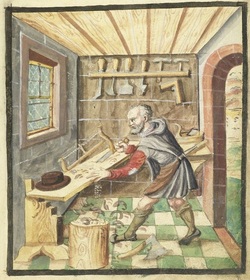
The term ‘wright’ comes from an Old English word from about 700 AD. ‘Wyrhta,” originally meant shaper of wood, but over time came to mean anyone who worked with wood, and then anyone who worked with his hands crafting something. It frequently was combined with the word for what was being crafted, creating compound words like shipwright, a person who builds ships, wheelwright, a person who builds wheels, or cartwright, a person who builds carts.
The word ‘wainwright’ is a combination of two archaic words; ‘wain,’ which is a large wagon used for farming, and ‘wright.’ While many small manors might have employed a cartwright, only a large or enterprising household would have employed a wainwright. A master wainwright would have built larger and sturdier wagons than a cartwright. His bustling shop would have employed wheelwrights, blacksmiths and painters.
The word ‘wright’ has persisted into the present predominantly as a surname. You may not know someone who works as a cartwright or a wainwright, but you may know someone who signs his name Cartwright or Wainwright. It is likely that an ancestor worked with wood or ships or wheels sometime in the distant past. Wright is the sixteenth most common surname in England.
In 1066 William the Conqueror brought the Normans into power in England, and Norman French words began infiltrating the English language which had been primarily Germanic, or Anglo and Saxon. The word ‘carpentier’ over time replaced ‘wright,’ and was gradually replaced by the simplified spelling ‘carpenter.’
By the mid-19th century, the use of wright as an occupational title had pretty much died. I can think of only one word in which it is still commonly used; playwrights are still crafting plays.

